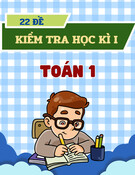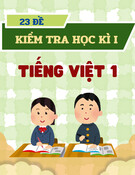SỞ GD-ĐT ĐỒNG NAI TRƯỜNG THPT CHUYÊN LƯƠNG THẾ VINH MÃ ĐỀ THI 104
ĐỀ KIỂM TRA GIỮA HỌC KỲ 1 MÔN: TIẾNG ANH - LỚP: 10 Ngày kiểm tra: 20/10/2017 Thời gian làm bài: 60 phút (Đề thi gồm 40 câu trắc nghiệm và 10 câu tự luận)
Họ, tên thí sinh:................................................................................................ SBD: ............................. Listening: (2 points) Part 1: You will hear five short conversations. You will hear each conversation twice. There is one question for each conversation. Choose the best answer for each conversation. 1. How much did the dress cost?
A B C
2. What type of accommodation does the woman live in?
A B C
A B C
A B C
A B C
3. What did the man get for Christmas? 4. What is the weather like? 5. What is the boy’s favorite subject?
Trang 1/4 - Mã đề thi 104
Part 2: Listen and fill in the gaps with the given words. You will hear the recording twice.
BOYS AND GIRLS IN SCHOOL In America:
A. 1972 - Since (0) A , boys/ girls have been taught (6) __________ - Now some schools trying to separate boys and girls Reasons for separate classes: B. worry 1. Boys (7)_____________ differently than girls. C. together Girls may not get to (8) ____________ D. talk
E. behave 2. Boys and girls can bother each other. Don’t (9) __________ on studies. 3. Girls and boys like different things. Teachers can make lessons that are interesting for girls or boys. F. focus Separate education now:
- Only some subjects are in separate classes. - Some teachers (10) ___________ that students won’t learn to work together. - Less than six hundred schools are trying it.
You will have time to transfer your answers to the answer sheet.
Choose the best answer that best completes each sentence. (1.8 points) Câu 11: The disabled students in the class have every reason to be proud ___ their efforts. A. in B. at C. of D. on
Câu 12: The house ___ two bedrooms, a kitchen and a living room. B. consists C. stimulates A. escapes D. comprises
Câu 13: He is not very good ___ Physics and Chemistry. A. on B. at C. with D. in
Câu 14: It ___ yesterday after it ___ dry for months. A. rained/ was D. had rained/ was
B. had rained/ had been C. rained/ had been Câu 15: I decided to become a professional ___ when I was first given a camera on my 15th birthday. A. photographic B. photograph C. photography D. photographer
Câu 16: Teaching is hard work, but I enjoy ___ with children. A. having worked B. working C. work D. to work
Câu 17: The parents realized that the young teacher was ___ great efforts to help their poor kids. A. doing B. making C. showing D. giving
Câu 18: Our flight was delayed, ___ meant we had to wait for hours at the airport. D. it C. which A. what B. that
Câu 19: She ___ the dream of a scientific career although it was impossible for a woman at that time. B. harbored C. made D. determined A. took
D. watched D. heat D. opposition C. contented C. peasant C. bottom B. worked B. repeat B. obtain
Choose the word whose underlined part is pronounced differently from that of the others. (0.6 point) Câu 20: A. pumped Câu 21: A. treat Câu 22: A. hospital Read the passage and decide which answer that best fits each gap. (1 point)
What is school for? This may seem an easy question to answer, but a survey in the USA shows people have different opinions on why kids go to school. The survey is called the 'Public’s attitudes toward the public schools'. It is from a (23) ____ association of education professionals called PDK International. PDK asked Americans to name the biggest (24) ____ of school. Just 45 per cent of people who took part in the survey said the main goal of school was to prepare students to pass exams. Around a (25) ____ of
Trang 2/4 - Mã đề thi 104
people said the main purpose was to get kids ready to join the workforce. Just over 26 per cent of Americans believed the biggest reason for school was to teach children about citizenship
B. globalize B. purpose B. quarter B. which B. talkative D. globally D. level D. little D. whether D. lazy C. global C. effort C. half C. what C. creative
When asked (26) ____ today's schools were doing the right thing, Joshua Starr, CEO of PDK, said, "We have to really question whether the direction we've been going is consistent with what the public wants." He quoted from author James Baldwin, who said in 1963 that the purpose of school is "to ask questions of the universe and learn to live with those questions." Students had different ideas about what school was for. Elena Brankov, 15, said school was to teach children to be (27) ____ , to share ideas with others and to use technology to make the world a better place. Lyndon Bailey, also 15, said school "is just to make poor kids into robots who work and make rich people richer." Câu 23: A. globalization Câu 24: A. preparation Câu 25: A. minimum Câu 26: A. when Câu 27: A. angry Choose the underlined part that needs correcting. (0.6 point) Câu 28: It is said (A) that the young has (B) the (C) future in (D) their hands.
Câu 29: Some of the students are (A) deaf, some dumb (B) and the others (C) mental retarded (D).
Câu 30: We came (A) to live (B) in Manchester a few (C) years ago. We used to living (D) in Nottingham.
Read the passage and choose the best answer to each question (1 point)
MADAME CURIE Madame Curie was a great scientist who made many great discoveries. Her story is one of inspiration and determination. She was born Maria Sklodowska on November 7, 1867, in Warsaw, Poland. Poland was in turmoil and her family struggled to make ends meet. Maria’s parents were teachers, and they taught their children the importance of school. Maria went on to graduate with honors from high school at 16. She lost her mother and her oldest sister to disease, and Maria struggled with a nervous illness. She went to the countryside to live with cousins.
Maria returned to Warsaw where she and her sister attended a “floating university.” The classes were held at night, and they had to avoid being caught by the police. They eventually left for Paris where she received a degree in physics and math. It took many years as she had to work to put her sister through school and then she put herself through school.
Marie eventually married Pierre Curie. Madame Curie, along with her husband, discovered two radioactive elements. This work laid the foundation for future discoveries in nuclear physics and chemistry. She and her husband received the Nobel Prize for Physics. Madame Curie would go on to receive another Nobel Prize for Chemistry eight years later. Madame Curie’s work was credited with making great achievements in science. Câu 31: Who taught Maria the importance of school? A. her sisters B. her teachers C. her parents D. her brother
Câu 32: Maria worked so that she could . . .
A. graduate from high school. C. pay her sister’s school fee and then hers. B. go to school. D. be trained in how to run experiments.
Câu 33: What is the meaning of the phrase “credited with” as used in the last paragraph? A. added to B. disregarded C. increased D. known for
Câu 34: Based on the reading passage, what interests did Marie have?
A. how to win the Nobel prize C. physics, chemistry, and math B. how to run an experiment D. math and chemistry
Câu 35: What is the main idea of paragraph three?
A. Curie’s choice of partner and husband B. Curie’s family background
Trang 3/4 - Mã đề thi 104
C. Madame Curie’s discoveries and contributions to science D. Curie’s love of science
Choose the best response for each situation. (0.6 point) Câu 36: “What do you do for a living?”
A. I am doing fine. C. I live to do what I want B. I live with my parents D. I am a dentist.
Câu 37: “How are you?”
A. I am a nice man, thanks. C. I am quite pretty, thanks. B. I am fine, thanks. D. I am hungry.
Câu 38: “Thank you for answering my questions.” B. Me too. C. It’s nice to see you. D. You’re welcome. A. Of course.
B. alarm B. timetable D. narrow D. purchase C. farming C. routine
Choose the word that has the stress pattern different from that of the others. (0.4 point) Câu 39: A. father Câu 40: A. passenger Give the correct form of the words in brackets to complete the following sentences. (1 point) Câu 41: Children with severe learning _____________ should be sent to special schools. (DISABLED)
Câu 42: Helen is very ____________. She looks great in photos. (PHOTOGRAPHY)
Câu 43: The founding of the Radium Institute in 1914 made Marie Curie’s ______________ wish come true. (HUMAN)
Câu 44: It was two weeks before Christmas and the mall was ____________. (CROWD)
Câu 45: What is Mr. Vy’s ______________? (OCCUPY)
Finish the second sentence so that it has a similar meaning to the first one, beginning with the given words or phrases. (1 Point) Câu 46: Have they delivered the package yet?
Has the package _____________________________________? Câu 47: We haven’t seen him for years.
It’s ________________________________________________. Câu 48: The plane took off before we arrived at the airport.
By the time _________________________________________. Câu 49: When I was young I liked football, but now I don’t.
I _________________________________________________. Câu 50: She always complains about her job when she meets me.
-----------------------------------------------
Whenever __________________________________________.
----------- THE END ----------






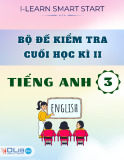
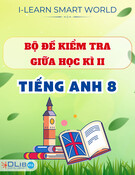
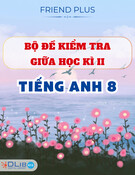
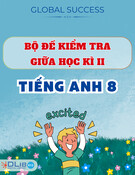
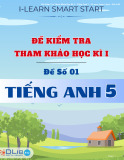

![Đề thi Tiếng Anh có đáp án [kèm lời giải chi tiết]](https://cdn.tailieu.vn/images/document/thumbnail/2025/20250810/duykpmg/135x160/64731754886819.jpg)
